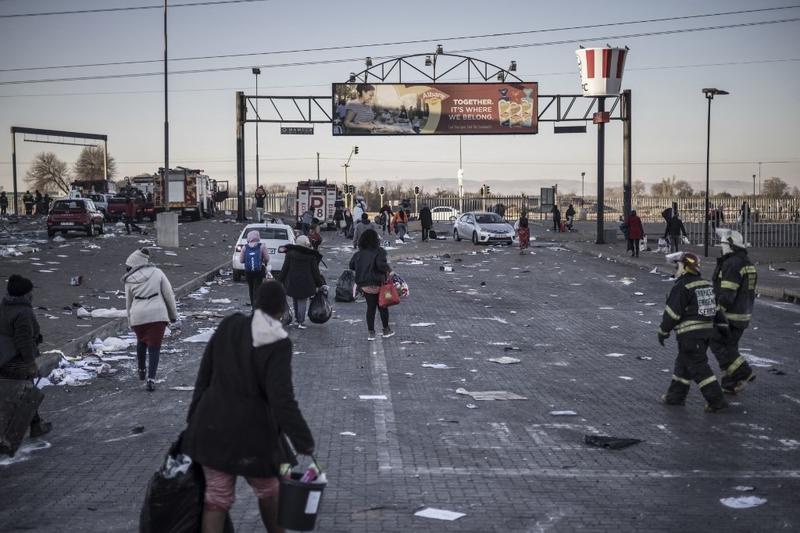 South African firefighters (right) look on as suspected looters walk outside a vandalised mall in Vosloorus, on the outskirts of Johannesburg, on July 14, 2021. (MARCO LONGARI / AFP)
South African firefighters (right) look on as suspected looters walk outside a vandalised mall in Vosloorus, on the outskirts of Johannesburg, on July 14, 2021. (MARCO LONGARI / AFP)
South Africa will significantly ramp up the number of soldiers deployed to help quell riots following days of looting and destruction of businesses, after the government said a military presence may be helping to ease the violence.
Defense Minister Nosiviwe Mapisa-Nqakula told lawmakers that troops in the provinces of KwaZulu-Natal and Gauteng will be boosted to 25,000 from about 5,000 now, following a discussion between the government and opposition parties.
“We are seeing less incidence of violence and looting reported,” acting Minister in the Presidency Khumbudzo Ntshavheni had earlier told reporters in Pretoria, the capital. More than 1,700 people have been arrested, she said.
At least 72 people have been killed since protests erupted on July 10, making the uprising the deadliest since apartheid ended in 1994
Protests erupted on July 10 after former President Jacob Zuma was incarcerated for defying a court order to testify before a graft inquiry and degenerated into a free-for-all in KwaZulu-Natal and Gauteng, two of the country’s main economic hubs. At least 72 people have been killed, making the uprising the deadliest since apartheid ended in 1994.
Marauding mobs have ransacked hundreds of businesses and destroyed telecommunications towers and other infrastructure, while transport networks and a program to vaccinate people against the coronavirus have been disrupted. The government logged 208 separate incidents of violence overnight Tuesday.
ALSO READ: Worst violence in years spreads in S. Africa as grievances boil over
Business Leadership South Africa, one of the main business lobby groups, estimates that damages amount to more than 5 billion rand (US$343 million) and counting for the retail industry alone. More than 200 malls were targeted, over 800 stores were looted and 100 were completely burnt, its Chief Executive Officer Busi Mavuso said in an emailed reply to questions.
Insurance headache
Attention is now turning to whether insurance companies will be able to cover the cost of the carnage, with claims estimated to run into several billions of rand. Much of that will have to be considered by Sasria, a South African state-owned company that specializes in cover related to social unrest and rioting.
The sheer number of affected businesses mean it’s likely that processing claims will be slow and an interim fund may have to be set up for support, said Martin Kingston, representing Business Unity South Africa, another industry group.
Acting Minister in the Presidency Khumbudzo Ntshavheni described the violence as “economic sabotage”
BUSA is calling for a rolling 24-hour curfew in the key provinces and a full deployment of the armed forces to bring an end to the crisis.
Infrastructure lost
“It will take two-to-three years to recover the infrastructure lost here,” Colin Coleman, former chairman of Goldman Sachs Group Inc. in Sub-Saharan Africa said in an interview to Bloomberg TV. “To restock these centers will take 10 weeks and we are going to have severe shortages for some time.”
Ntshavheni urged people not to resort to panic buying because there is enough food for everyone, and said the security agencies will escort vehicles carrying goods from KwaZulu-Natal’s Durban port, the country’s largest, to destinations inland to safeguard supply chains. She described the violence as “economic sabotage.”
“We are not at liberty to announce who are behind it,” she said. “If we do so we will jeopardize the investigation and possible prosecution of people.”
READ MORE: S. Africa deploys army to quell unrest linked to Zuma jailing
Some business groups have urged President Cyril Ramaphosa to give the police and army additional powers to end the violence, fearing that communities and private militias will mete out their own form of justice. Video footage published on Johannesburg-based radio station Kaya 959’s website showed private security guards firing live ammunition at a mob on Tuesday.
While the government has shied away from declaring a state of emergency - a measure the apartheid regime used to counter opposition to White-minority rule, Ntshavheni said it could review its stance depending on how the situation evolves.
Ramaphosa’s office said he’d consulted with the leaders of religious groups, business and political parties on how best to restore stability.
Paper producer Sappi Ltd., retailer Mr Price Group Ltd. and fast-food restaurant operator Famous Brands Ltd. have joined a long list of firms whose operations have been interrupted. Hapag Lloyd AG told customers that it’s shutting some of its container-shipping facilities.


